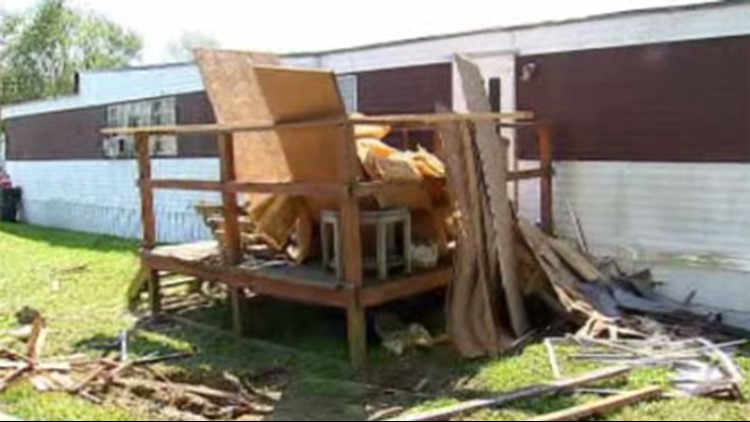GREENSBURG - A Decatur County homeowner has serious questions for a power company.
An old power pole snapped in two, causing a transformer to crash through the roof of Johnnie Watson's Greensburg home and explode. He's now worried about toxic contamination.
Watson ran away from the door to a bedroom to find shelter from a severe storm last Wednesday.
"That's when the transformer come down through and it blew up in the house. There were sparks everywhere, big blue flash," he said, describing the moment his house was hit by the unexpected intruder.
When the smoke cleared, Watson saw an oil-filled transformer dangling through the bedroom ceiling of his mobile home. Heavy tree limbs and 90 mile an hour winds snapped the Duke Energy power pole, punctured the transformer and sent chemicals spewing.
"Yeah, all over the floor, in the walls. It saturated everything, even underneath on my floor, they forgot some, I seen it when I got under there yesterday," said Watson, pointing out the areas in question.
Our cameras found the snapped pole where the old transformer once hung. The equipment was gone, but not the smell of oil.
Duke Energy put buoys on the ground to soak up the run off, but bagged and shipped Watson's belongings to test for PCB's, chemicals known to cause cancer.
The Utility Solid Waste Activities Group tracks electric companies and the reduction of PCB's. In a report from April 2006, the group reported "Duke Energy currently has only a few known PCB Transformers in its system...When Duke Energy identifies distribution equipment containing (equal or more than) 50ppm PCBs, the Company either replaces...or retrofills the equipment."
"They said when it dries out they're going to take dirt from under my house and replace it. So that tells me it's toxic. It can't be okay if they're going to come and remove my dirt," Watson explained.
Duke Energy tells Eyewitness News it's all an "abundance of caution," and that testing found no harmful levels of PCB's from Watson's home.
But no one told Watson. He says crews also revealed something else.
"One of the guys told me that, yeah, that pole and the transformer should have been changed, switched out in 1970, in the 70s," he added.
Ripped to shreds in some parts, Watson can't say who will fix his mobile home. He has no insurance.
He says Duke Energy has left him dangling on the line.
"Have they offered you anything to help you?," asked Eyewitness News.
"Nothing," said Watson. "Duke Energy said 'No, it's an act of God.'"
The power company now promises to reach out to Watson yet this week.
Wednesday's storm brought down 40-50 spans of wire, 15 poles and damaged 10 transformers in Greensburg. All 6,000 customers who lost power were restored within 48 hours.
Full Utility Solid Waste Activities Group report
The full Utility Solid Waste Activities Group member company PCB reduction effort report from April 2006:
Duke Energy, which serves 3.8 million electric customers in North Carolina, South Carolina, Ohio, Kentucky and Indiana, has implemented a voluntary PCB phase-down program. Duke Energy has tested all large electrical equipment in its substations, power plants and vaults. Any equipment containing > 50 ppm PCB oil that was identified in these areas have been removed and replaced with units containing no PCBs, or have been retrofilled to bring the PCB level to < 50 ppm PCBs, or have been upgraded with spill prevention controls to prevent any release to the environment. Because of these efforts, Duke Energy currently has only a few known PCB Transformers (> 500 ppm) in its system, and no PCB large capacitors. As a matter of general policy, when Duke Energy identifies any distribution type equipment containing > 50 ppm PCBs, the Company either replaces the equipment or retrofills the equipment to bring the PCB level to < 50 ppm PCBs as soon as feasible. Further, in Indiana, Duke has tested all transformers on school properties (K through 12th grade), and any transformers containing > 50 ppm found in these areas have been voluntarily removed and replaced with transformers containing no PCBs.



